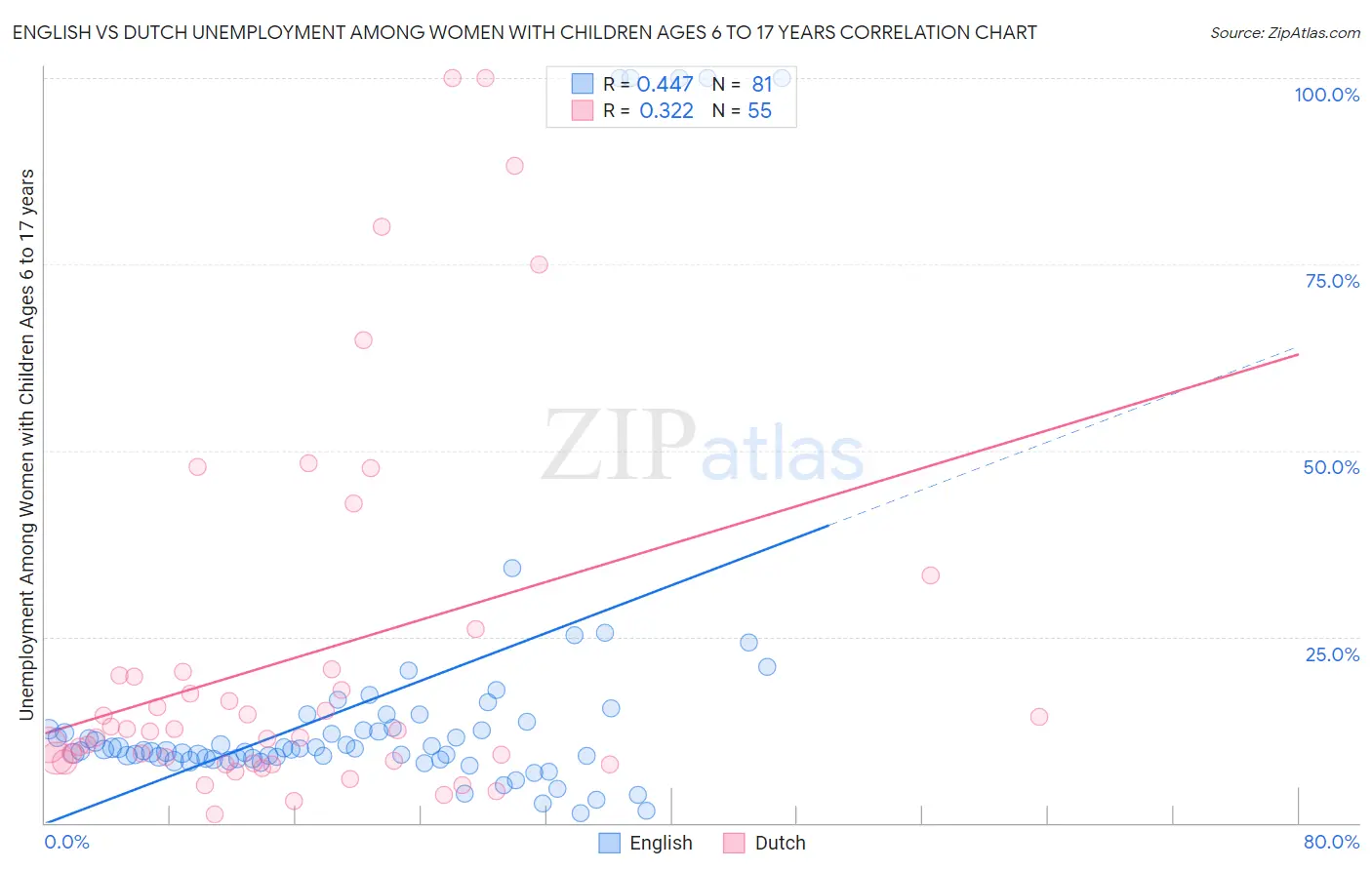English vs Dutch Unemployment Among Women with Children Ages 6 to 17 years
COMPARE
English
Dutch
Unemployment Among Women with Children Ages 6 to 17 years
Unemployment Among Women with Children Ages 6 to 17 years Comparison
English
Dutch
9.4%
UNEMPLOYMENT AMONG WOMEN WITH CHILDREN AGES 6 TO 17 YEARS
1.9/ 100
METRIC RATING
244th/ 347
METRIC RANK
9.4%
UNEMPLOYMENT AMONG WOMEN WITH CHILDREN AGES 6 TO 17 YEARS
1.5/ 100
METRIC RATING
248th/ 347
METRIC RANK
English vs Dutch Unemployment Among Women with Children Ages 6 to 17 years Correlation Chart
The statistical analysis conducted on geographies consisting of 358,817,794 people shows a moderate positive correlation between the proportion of English and unemployment rate among women with children between the ages 6 and 17 in the United States with a correlation coefficient (R) of 0.447 and weighted average of 9.4%. Similarly, the statistical analysis conducted on geographies consisting of 349,724,133 people shows a mild positive correlation between the proportion of Dutch and unemployment rate among women with children between the ages 6 and 17 in the United States with a correlation coefficient (R) of 0.322 and weighted average of 9.4%, a difference of 0.27%.

Unemployment Among Women with Children Ages 6 to 17 years Correlation Summary
| Measurement | English | Dutch |
| Minimum | 1.3% | 1.2% |
| Maximum | 100.0% | 100.0% |
| Range | 98.7% | 98.8% |
| Mean | 16.4% | 22.3% |
| Median | 9.8% | 12.4% |
| Interquartile 25% (IQ1) | 8.6% | 8.1% |
| Interquartile 75% (IQ3) | 13.2% | 20.2% |
| Interquartile Range (IQR) | 4.6% | 12.1% |
| Standard Deviation (Sample) | 22.2% | 24.9% |
| Standard Deviation (Population) | 22.1% | 24.6% |
Demographics Similar to English and Dutch by Unemployment Among Women with Children Ages 6 to 17 years
In terms of unemployment among women with children ages 6 to 17 years, the demographic groups most similar to English are Immigrants from Cameroon (9.4%, a difference of 0.030%), Scottish (9.4%, a difference of 0.050%), Immigrants from Colombia (9.3%, a difference of 0.14%), Colombian (9.3%, a difference of 0.16%), and Immigrants from Africa (9.4%, a difference of 0.20%). Similarly, the demographic groups most similar to Dutch are Immigrants from South America (9.4%, a difference of 0.010%), Polish (9.4%, a difference of 0.040%), Immigrants from Africa (9.4%, a difference of 0.070%), Immigrants from Guatemala (9.4%, a difference of 0.10%), and Central American (9.4%, a difference of 0.11%).
| Demographics | Rating | Rank | Unemployment Among Women with Children Ages 6 to 17 years |
| Hungarians | 3.0 /100 | #236 | Tragic 9.3% |
| Immigrants | Belize | 2.8 /100 | #237 | Tragic 9.3% |
| Arabs | 2.7 /100 | #238 | Tragic 9.3% |
| Immigrants | Saudi Arabia | 2.7 /100 | #239 | Tragic 9.3% |
| Guatemalans | 2.3 /100 | #240 | Tragic 9.3% |
| Colombians | 2.2 /100 | #241 | Tragic 9.3% |
| Immigrants | Colombia | 2.1 /100 | #242 | Tragic 9.3% |
| Scottish | 2.0 /100 | #243 | Tragic 9.4% |
| English | 1.9 /100 | #244 | Tragic 9.4% |
| Immigrants | Cameroon | 1.8 /100 | #245 | Tragic 9.4% |
| Immigrants | Africa | 1.6 /100 | #246 | Tragic 9.4% |
| Poles | 1.5 /100 | #247 | Tragic 9.4% |
| Dutch | 1.5 /100 | #248 | Tragic 9.4% |
| Immigrants | South America | 1.5 /100 | #249 | Tragic 9.4% |
| Immigrants | Guatemala | 1.3 /100 | #250 | Tragic 9.4% |
| Central Americans | 1.3 /100 | #251 | Tragic 9.4% |
| Creek | 1.2 /100 | #252 | Tragic 9.4% |
| Portuguese | 1.1 /100 | #253 | Tragic 9.4% |
| Nicaraguans | 1.0 /100 | #254 | Tragic 9.4% |
| Lithuanians | 0.9 /100 | #255 | Tragic 9.4% |
| Canadians | 0.8 /100 | #256 | Tragic 9.4% |